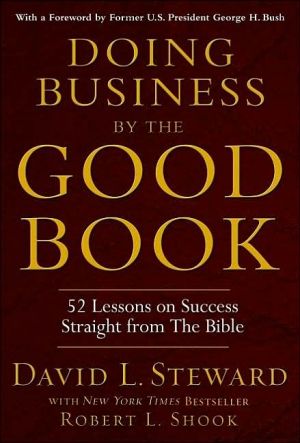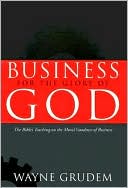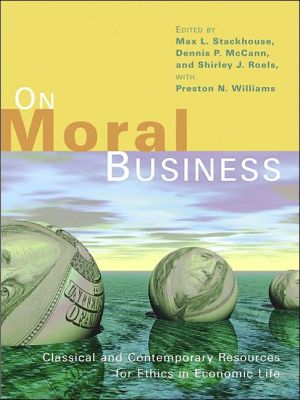Doing Business by the Good Book: 52 Lessons on Success Straight from the Bible
An indispensable volume that shows how to succeed in business by using the Bible and its lessons as a source of inspiration and guidance n 1990, David L. Steward founded his company, Worldwide Technology, Inc., on a shoestring budget and borrowed money, well aware of the high-risk nature of the venture he was undertaking. Despite the fact that he was a novice entrepreneur, he was certain he would succeed. Steward believed intensely that God wouldn't let him down. Doing Business by the Good...
Search in google:
Foreward written by George H. Bush. An indispensable volume that shows how to succeed in business by using the Bible and its lessons as a source of inspiration and guidance.In 1990, David L. Steward founded his company, Worldwide Technology, Inc., on a shoestring budget and borrowed money, well aware of the high-risk nature of the venture he was undertaking. Despite the fact that he was a novice entrepreneur, he was certain he would succeed. Steward believed intensely that God wouldn't let him down. Doing Business by the Good Book shares the inspiring lessons culled straight from the Bible, that Steward used to build his privately held billion-dollar company into a global information technology enterprise. "David Steward has come up with an idea that betters the way we live and work. The idea that he embodies is not actually new-it is a 2,000-year-old philosophy that makes as much sense today as it did back then." (Former President George H. Bush, from the foreword to Doing Business by the Good Book) In Doing Business by the Good Book, Steward delivers 52 chapters, each accompanied by scriptural passages that emphasize their impact on his personal struggle to build a billion-dollar business. Included are chapters such as: — Being a Customer-Driven Company "In everything do to others as you would have them do to you." (Matthew 7:12) — Implementation "Be doers of the world, and not merely hearers who deceive themselves." (James 1:22) — Praise and Recognition "Do not withhold good from those to whom it is due, when it is in your power to do it." (Proverbs 3:27) — Good Leadership "This is my commandment, that you love one another as I have loved you." (John 15:12) — Consistency "Now faith is the assurance of things hoped for, the conviction of things not seen." (Hebrews 11:1) David L. Steward is the founder and CEO of Worldwide Technologies, Inc., which Black Enterprise magazine named as the largest African-American owned company operating in the United States. Steward also serves as the co-chairman of the United Way in St. Louis, Missouri, his hometown. Robert L. Shook is the author of numerous books, including the New York Times bestseller Longaberger. He lives in Columbus, Ohio. Publishers Weekly Jesus' teachings were not meant to be spoken only on Sunday, writes Steward, CEO of World Wide Technology Inc., the world's largest African-American-owned company. Rather, those teachings were meant to be implemented everywhere, including the workplace. In this book, Steward shares 52 biblical principles in short, easy-to-read chapters that can be digested once a week for a full year or devoured in one sitting. Steward draws heavily on his own knowledge of building a high-tech company from the ground up, and also his corporate experiences at FedEx and Union Pacific. He has a real knack for helping readers see how biblical principles relate to those experiences and to contemporary business issues. Even the trendy notion of "branding" is placed thoughtfully with a relevant Scripture (Matthew 12:33: "Either make the tree good, and its fruit good, or make the tree bad, and its fruit bad; for the tree is known by its fruit."). Christian businesspeople who want a solid introduction to biblical ethics in the workplace will particularly enjoy his fine chapters on accountability, enthusiasm, customer satisfaction and networking. (Jan.) Copyright 2004 Reed Business Information.
The Entrepreneurial Spirit\ \ \ Give, and it will be given to you. A good measure, pressed down, shaken together, running over, will be put into your lap; for the measure you give will be the measure you get back.\ --Luke 6:38\ In the dictionary, an entrepreneur is defined as "one who organizes, manages, and assumes the risk of a business." While the definition is valid, it seems sterile without a reference to the entrepreneurial spirit.\ When I think about the big leap I took by venturing out on my own, I had more on my mind than just organizing, managing, and assuming the risk of a business. My thoughts focused on Noah's faith in God when he built the ark. Genesis 6:13-16 describes God telling Noah that he would destroy all flesh because the earth was filled with violence. Then God instructed Noah to build an ark measuring 300 cubits in length, or about 450 feet. The ark's width should be 75 feet and it should stand 45 feet high.\ Imagine how much Noah had to trust God to take on such a task. Working with crude tools, Noah, a farmer from Ur, and his sons, Shem, Ham, and Japheth, constructed this huge vessel -- the biggest ever built in its day. Noah built it exactly to God's specifications, never deviating from his instructions. The ark was supposed to save Noah and his family from an impending flood, yet there were no clouds in the sky that showed any sign of even a rain shower. Still, Noah and his sons worked day and night on the ark. People came from near and far to see the four driven men build the huge ark in the desert. Neighbors and visitors ridiculed and cursed Noah, yet he never abandoned his faith in God.\ True, starting my own company was a miniscule task compared to Noah's. I was the son of a mechanic, who was also a man of the soil. My father worked a small farm -- consisting of a couple of cows, a few chickens, and some hogs -- to feed his family of ten. Even though I had received my business degree from Central Missouri State University in 1973 and had held various sales and marketing positions with Union Pacific Railroad and Federal Express, people didn't hesitate to question me: "What do you know about owning your own business? How could you quit a good job to start your own company?"\ When you dare to have ambitions, people tend to ridicule you; they become vocal about why you cannot and even should not attempt to pursue your dream. Some well-meaning friends and family members are trying to protect you, while others may be jealous that you might succeed. Few have the same belief in you that you have in yourself. There will always be someone who wants to rain on your parade, but an entrepreneur can't be swayed by other people's standards. Don't let them put you into a box. If you buy into what's expected of you, you'll be restricted by others' limitations. Better you should be guided by God's unlimited promise. We've all been told: "Finish your education, get a good job, work for a good company, and you'll have a great life." In other words, work all your life, get a gold watch, and retire.\ This message is repeated and reinforced by people who are all too willing to tell us what they think we should do. Friends, teachers, and even college professors continually reinforce it, and then parents confirm this message to their children by being living examples of it. It takes a leap of faith to raise yourself above what others expect of you. The hardest thing to do is take that first step to overcome your fears and self-doubt, especially when you're surrounded by doubting Thomases who constantly reinforce those fears, based on their personal beliefs.\ Becoming a player in the world of Information Technology (IT), which was a new revolution in the 1980s, presented challenges to all who sought entry, and, in particular, an African-American. To this day, I can visualize the frowns on the faces of friends and family who said, "You know they won't let you do that." I wondered, "Who are they?"\ Following about ten years of employment in corporate America, in 1984 I started my own company, Transportation Business Specialists. My transition to the role of sole proprietor was difficult; it meant no longer having a supervisor to rely on, no steady paycheck, and no expense account. The umbilical cord was cut; I relinquished the safety net of a large corporation. Along with a second entity, a sister company I created called Transport Administrative Services, we provided services to the transportation industry by locating inefficiencies in the commercial freight industry. These auditing services revealed how much the railroads were losing for undercharges as opposed to overcharges. At the time, many companies provided overcharge services informing customers that ship by rail when they were charged too much, but nobody had ever taken our approach and worked the other end of the equation. Consequently, we were engaged to do an undercharge audit of three years' worth of freight bills for Union Pacific Railroad, which meant that my company would manage $15 billion of rate information for a single client.\ The only way to handle that amount of information was through a local area network to link all of their operations, so we built what was at the time the biggest network in St. Louis. After I learned the benefits of effectively integrating technology to solve business problems, I formed my current company, World Wide Technology, in 1990 with an investment of $250,000, hard-eared money from my two earlier ventures.\ WWT wasn't exactly an "overnight success." We had our peaks and valleys, and although I never missed a single payroll, many weeks I didn't receive my own paycheck. Employees always came first. At one point in 1993, things were so tight, a collection company repossessed my car right from our parking lot. Fortunately, I ran after the car and was able to stop it so I could retrieve my briefcase from the trunk.\ When friends and acquaintances asked my wife, Thelma, about our new venture, and she explained what our IT company did, they'd roll their eyes. Once a woman told Thelma, "Well, you guys must like living on the edge." We quickly learned to throw conventional wisdom out the window, knowing that what the world thinks is wise, God thinks is foolish.\ It is always darkest before the dawn, and even in the most discouraging times, I never lost my faith in God. I was in his hands, and I always knew the Lord would look after me. I constantly reminded myself that when God told Abraham to take his only son to the altar to sacrifice him, Abraham did as he was told. Imagine the confusion in Abraham's mind -- a man who was incredibly old when his son was born, and yet he was prepared to sacrifice him. At the time, Abraham didn't know God would have him sacrifice a lamb instead. If Abraham could have such faith in God, I believed I too could trust God to look after me.\ Throughout my life, I have followed examples set by individuals in the Bible, such men as Abraham, Noah, and David, who had been given a charge to do God's work. And I, through my business and my daily life, have a charge to do God's work, to be obedient and find favor with the Lord.\ As the Bible tells us, we are here to sow seed into people's lives. In Luke 6:38, Christ says: "Give, and it will be given to you. A good measure, pressed down, shaken together, running over, will be put into your lap; for the measure you give will be the measure you get back." I live my life by these words. My objective in business is not driven by how much money I may make. I seek to serve and to give to others.\ In business, my biggest job as CEO and owner of my company is to serve others. My charge is to serve the employees of this organization and serve them well. In my company, I strive to nurture service and commitment to others, an attitude that places others before us. We abide by this philosophy rather than participating in a self-serving culture, and it permeates externally to customers and suppliers. Then, like a pebble cast into a lake, its ripples eventually reach the shore. Trust and loyalty communicated to others assures long-term success.\ Jesus devoted his life to serving others. Even at the Last Supper, Jesus demonstrated that he was here to serve when he knelt to wash the feet of his disciples. In doing so, Jesus humbled himself, because Hebrew culture viewed the washing of feet as the lowliest of acts. Some of his disciples were so embarrassed, they argued and refused to have their Lord and Savior serve them. But Jesus was there to serve, just as he was there to sacrifice his life for us.\ Similarly, the success of a business owner is dependent upon his or her desire to serve others. I believe this philosophy of servitude epitomizes the entrepreneurial spirit.\ Copyright c 2004 David Steward and Robert L. Shook
ForewordxiiiIntroduction11The Entrepreneurial Spirit92Integrity153Delegation194Striving for Excellence235Adapting to Change276Finding a Niche337Good Leadership is Serving Others378Building Long-Term Relationships419Taking a Stand4510Consistency5011Teamwork5412Risk-Taking5713Being a Customer-Driven Company6314Confrontation6815Having a Vision7416Long-Term Thinking8117A Mission Statement8518The Big Picture8919Dealing With Adversity9520Creativity and Innovation10221Fire in the Belly10722Mentoring11123A Company is Known by the People it Keeps11624Branding12125Being a Technology-Driven Company12626Accent the Positive13127Communicating With People13528Nothing Happens Until Something is Sold14129The Joy of Work14630The Art of Listening15131Good Leadership is Love15532Think Big15933The Personal Touch16534Never Underestimate the Competition17335Empowerment17936Having a Contingency Plan18437It's About Time19138Be Flexible19739Your Inner Voice (The Holy Spirit)20140People Will Support What They Help Create20641Networking21142Conviction21743Having a Succession Plan22444Blessed to be a Blessing22845A Supportive Spouse23146Accountability23747Praise and Recognition24148Competing to Win24649Implementation25050The Joy of Giving25551Let Go and Let God26352God Bless America266
\ Publishers WeeklyJesus' teachings were not meant to be spoken only on Sunday, writes Steward, CEO of World Wide Technology Inc., the world's largest African-American-owned company. Rather, those teachings were meant to be implemented everywhere, including the workplace. In this book, Steward shares 52 biblical principles in short, easy-to-read chapters that can be digested once a week for a full year or devoured in one sitting. Steward draws heavily on his own knowledge of building a high-tech company from the ground up, and also his corporate experiences at FedEx and Union Pacific. He has a real knack for helping readers see how biblical principles relate to those experiences and to contemporary business issues. Even the trendy notion of "branding" is placed thoughtfully with a relevant Scripture (Matthew 12:33: "Either make the tree good, and its fruit good, or make the tree bad, and its fruit bad; for the tree is known by its fruit."). Christian businesspeople who want a solid introduction to biblical ethics in the workplace will particularly enjoy his fine chapters on accountability, enthusiasm, customer satisfaction and networking. (Jan.) Copyright 2004 Reed Business Information.\ \


